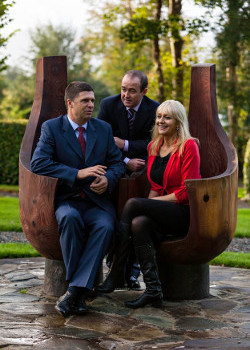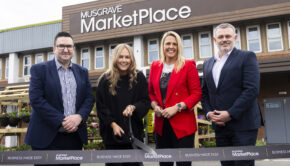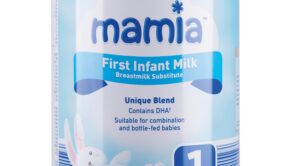Londis heralds success of chilled

Gillian Hamill travelled to the Londis national retailer conference in Killarney to hear more about how the group has navigated a path through the challenges of the past year
17 October 2012
The Londis National Retailer Conference 2012 got off to a stylish start this year when it was opened by broadcaster and Prime Time presenter Miriam O’Callaghan in her role as MC. ADM Londis CEO Stephen O’Riordan delivered the opening address for the day’s proceedings, which took place at the Malton Hotel in Killarney on 2 October.
In his address, he discussed the group’s successes of the past year. Chief among these was the major impact of the group’s centralised chilled distribution facility which has delivered average price savings of over 6% for retailers. Stores have also benefited from Londis’ bespoke web based ordering platform ISIS, which provides live information on product sales, stock levels and best sellers.
O’Riordan also unveiled phase two of the chilled programme. This will bring more market leading brands online with a corresponding reduction in supplier deliveries on the shop floor leading to even greater operational savings for retailers. With the addition of over 400 product lines as part of phase two, the chilled offering from Londis will grow to approximately 1,200 products.
Phase two will also result in the availability of Nisa Today’s chilled private label range to the full Londis estate on a weekly basis. Coupled with the growth of the Londis own-brand range, which has more than doubled since the advent of centralised chill, O’Riordan believes Londis retailers are well placed to respond to the greater consumer demand for private-label.
The psychology of the customer in 2012
Dr Melrona Kirrane, academic director, Dublin City University Business School
Dr Melrona Kirrane
The first speaker of the day, DCU’s Dr Melrona Kirrane, examined why consumers buy certain items in order to help retailers get a better handle on how to meet their needs.
She believes market segmentation is crucial to success and explained that consumers can be categorised into four groups during a recession.
The first of these is the ‘slam-on-the-brakes’ segment. This sector feels most vulnerable and hardest hit financially. They are mainly lower-income consumers but this segment also includes higher-income consumers who have fallen on hard times.
The next group is the ‘pained but patient’ segment. These consumers tend to be resilient and optimistic about the long term. However they are less confident about recovery prospects in the near term, as well as being less confident of their ability to maintain their standard of living.
‘Comfortably well-off’ consumers form the third segment. This consists primarily of people in the top 5% income bracket. They feel secure about their ability to ride out current and future bumps in the economy. It also includes those who are less wealthy but who feel confident about the stability of their finances.
Finally Dr Kirrane outlined the live-for-today segment; consumers who carry on as usual – unless they become unemployed. Typically urban and younger, these consumers are more likely to rent than to own, and they spend on experiences rather than stuff, with the exception of consumer electronics.
Next, she looked at what shoppers are buying. These purchases can also be categorised into four groups; essentials, treats, postponables and expendables.
The key message of Dr Kirrane’s presentation was that different consumers will react differently in a recession according to what segment they’re in.
During a recession, the slam on the breaks segment, when shopping for essentials, will seek lower cost products and brand substitutes such as own-label. In terms of treats, they will deeply reduce these, eliminate them or seek low cost substitutes.
For the pained but patient consumers, retailers operating within the essentials category should offer a lower priced option, promote bonus packs to encourage stock-piling, and emphasise the dependability of a branded product or service. When selling treats to this group of customers, retailers should reward loyal consumers, even if they consume less. Products should also be advertised as morale raisers and as affordable alternatives to more expensive luxuries.
Comfortably well-off shoppers when buying essentials, will continue to buy favourite brands at pre-recession levels but will be more selective in purchasing luxuries. Retailers and brands therefore need to continue awareness advertising for essential products and brands. Within the treats category, products should be advertised as "an item you deserve because you are successful".
Live for today consumers will also continue to buy favourite brands at pre-recession levels when they are shopping for essentials. Retailers should therefore continue awareness advertising. Within the treats category, it is important to remind customers of the "You can’t live without it" message.
The lesson reiterated by Dr Kirrane was that "one cap does not fit all" and that it is vital to know your core customer, so that you can tailor your retail offering accordingly.
A novel analogy
Kieran O’Farrell, head of trading, ADM Londis plc
Kieran O’Farell of ADM Londis took to the podium next to discuss how the symbol group and its retailers have fared in the past year. He colourfully described the current state of economy as "Fifty Shades of Turmoil."
Continuing with his bestseller theme, O’Farrell told Londis retailers that "together we have traded through the storm" and that their joint story was "getting on with the business of staying in business". To illustrate this, he highlighted that Londis warehouse prices have dropped 13% since 2009. Other successes included launching centralised chill distribution, staying ahead in technological terms through the group’s ISIS offering and delivering competitive value offers.
He highlighted that ADM Londis was "committed to the long term and continued brand investment" as demonstrated by factors such as its EUR*5 million investment in warehousing.
The next chapter for Londis is profitable growth as a bestseller in the symbol sector. O’Farrell believes the group and its retailers will achieve this by "focusing on the basics" and "using our combined strength to deliver for customers".
To achieve this goal, the group is focusing on its low price guarantee and prioritising its value perception. However O’Farrell added it is crucial to deliver value without a race to the bottom. It is essential to focus on categories that offer value with margin, such as the deli and in-store tea and coffee offerings.
Due to a growing demand for own-label, Londis’ chilled own-label range doubled in 2012. Local and regional favourites are now available nationwide such as Clonakilty, William Carr and Irish Yogurts ranges. The group has also extended its Nisa Heritage range.
Helpful and welcoming staff will continue to provide a compelling reason for customers to return Londis stores. The group’s retailers also form a vibrant part of their communities by getting involved in local initiatives.
Further positive news, showing the success of Londis providing its retailers with iPads last year, was that the amount of orders placed electronically has now reached 98%.
O’Farrell ended on another upbeat note. "We’ve come through a very difficult journey," he said. "Together we can write the next bestseller; Fifty shades of profitable growth."
You are the difference
Alf Dunbar, author and performance coach
As creator and founder of the highly successful customer service coaching programme, "You are the Difference", Alf Dunbar is one of the UK’s top performance coaches within the customer service industry. Speaking at the Londis Annual Conference 2012, he delivered an energetic and upbeat presentation based on his own experiences of working on a shopfloor. In 1994, he had two skin/hair care retail franchises in Denmark which were failing and the franchisor was demanding to be paid back for his store refurbishments. Faced with crisis, Dunbar managed to turn his businesses around by using the methods he shared with Londis retailers at the conference. In his introduction to the YATD programme, Dunbar gave delegates some simple tools to help them raise the service/sales bar in their stores and have a more positive day.
One of Dunbar’s first lessons was that retailers should try to not be affected by what has gone before. Dunbar believes while "figures are part of our past…customers are our present and future". Another central message was that "people buy people first, the product is second".
To be the best people possible for the job, Dunbar was keen to promote the benefits of thinking outside the box. "If we keep doing the same thing, we will get the same results," he said.
The performance coach illustrated the importance of adopting the right attitude towards your customers on each visit by calculating the lifetime loyalty value of a Londis customer. If on average, a customer visits a store for 30 years, 100 times a year and purchases an average spend of €15 each time, then that customer will be worth €45,000 to a business over their lifetime – clear evidence that the effort retailers put in is worth it. In fact, research shows 68% of customers will defect from a business due to the way they are treated.
The performance coach also offered some useful tips on how to provide good customer service in-store. These included asking customers looking for goods on the shopfloor: ‘Is there anything else you need today?’ Using the word ‘need’ is more effective than asking if you can help them find anything else. Likewise, if a customer has been waiting in a queue it is better to say "Thanks for waiting" instead of apologising as this is a positive message which acknowledges the customer’s patience.
Kick-starting results
Niall Quinn, MBE, Irish soccer international and former chairman of Sunderland FC
Niall Quinn was the final speaker of the day and kept everyone entertained with amusing anecdotes spanning his career from the two decades he spent as a professional footballer, to becoming an entrepreneur, running his own broadband business this year. He combined these tales with pithy nuggets of wisdom about what he has learned about teamwork and leadership along the way.
He told the assembled audience stories of the many characters he met along the way, during his time playing professionally for Arsenal, Manchester City and Sunderland. He also explained more about his experiences of leading a consortium of business people to purchase Sunderland FC in 2006. Fortunately his belief in the potential of the club paid-off, as during his first season as chairman, the club was promoted to the Barclay’s Premier League, where it has remained and flourished ever since. Leaving Sunderland in 2012, Quinn concluded his presentation by telling delegates of his experiences of running his own company Qsat, which provides high speed broadband to unserved rural locations in Ireland, England and Africa.



 Print
Print






Fans 0
Followers